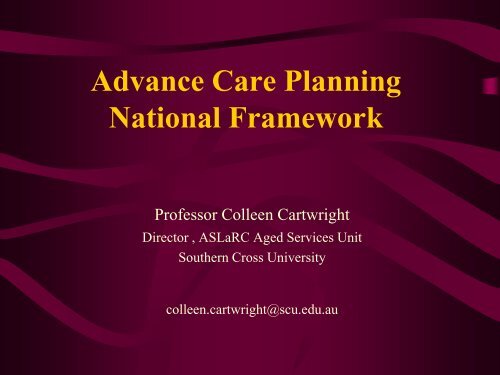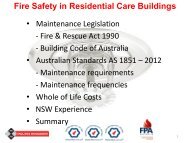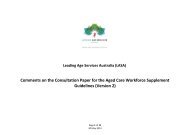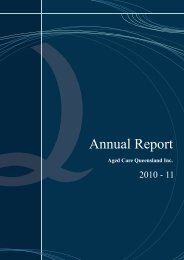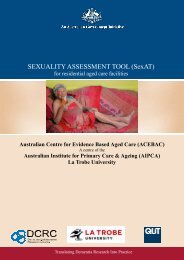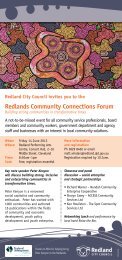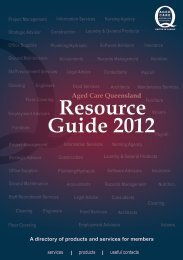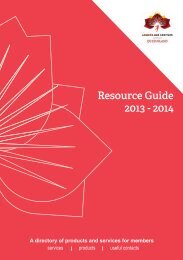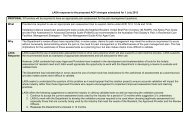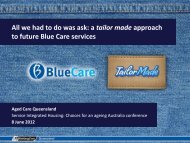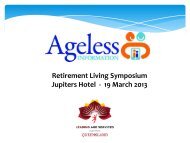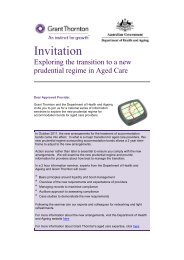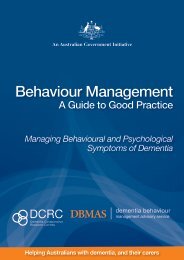Professor Colleen Cartwright, Southern Cross Univesity
Professor Colleen Cartwright, Southern Cross Univesity
Professor Colleen Cartwright, Southern Cross Univesity
You also want an ePaper? Increase the reach of your titles
YUMPU automatically turns print PDFs into web optimized ePapers that Google loves.
Advance Care PlanningNational Framework<strong>Professor</strong> <strong>Colleen</strong> <strong>Cartwright</strong>Director , ASLaRC Aged Services Unit<strong>Southern</strong> <strong>Cross</strong> Universitycolleen.cartwright@scu.edu.au
Context for ACP• Better living conditions/health care have led toincreased longevity – this is a success story, and it hasrightly been celebrated as such.• In addition, rapid technological development hasallowed people who would have previously died to bekept alive for long periods of time, often through theuse of such things as ventilators and PEG tubes.• But• These successes have led to practical, legal & ethicalissues, in particular around end-of-life care andextending the dying process
Fears and Concerns in the General• Cases ReportedCommunity– Loved one “left hooked up to machines until the veryend. We couldn’t even get close enough to give him ahug and say goodbye”.– “Mum always said she wouldn’t want to be resuscitatedif her heart stopped, but they wouldn’t listen”.– “I want to make sure that doesn’t happen to me”
Community Concerns in TerminalIllness: Rank OrderFACTORS Q1 Q2 NTLoss of Mental Faculties 1 1 1Loss of Control 2 2 2Loss of Independence * 3 3Burden on Family * 4 4Loss of Dignity 4 5 5Leaving Loved Ones 5 * 6Protracted Dying * * 7Extreme /Physical Pain 3 6 8Death Itself 9 9 10/10
Advance Care Planning Helps toAddress Fears & ConcernsACP is a process that allows a person to make andcommunicate – in advance – decisions about theirhealth care (including medical and dental treatment) fora future time when they may have lost capacity.Ideally it involves a discussion between the person,their health care provider and their carer/ family/friends, about their values, beliefs and views about endof-lifecare, and recording those decisions.
Benefits of Advance Health Care Directives• Gives control back to patient• Ensures patient’s wishes are known - patient’sown words• Assists health care provider with decision-making• Relieves family stress at time of trauma• Gives security in relation to future events (allowsperson to live well now by taking away fear of endstage of life)
Barriers to Use of Advance HealthCare DirectivesBarriers for GPs:Time to do it; Uncertainty about legal statusBarriers for Patients/Community Cty % HPs %Don’t know how to 61 88Don’t know enough about them 60 91Prefer to leave decision to doctor 37 63Don’t like to think about end-of-lifeissues33 75Prefer to leave decision to family 29 69
When Does a Person Have Capacity toMake A Decision (e.g. EG/AHCD)?• Person is competent unless proved otherwise• Person must understand the nature and the effectof the decision to be made – (case study);• Person must be able to communicate theirdecision in some way - not necessarily byspeaking or writing - body language may beadequate, e.g. nodding/ shaking head
Evaluating Capacity• Beware the Mini-Mental State Test – this was NOTdesigned to test Capacity – it is a screening tool:(cases).• There is good evidence that it should not be used forolder people, people with low education or peoplefrom ATSI or CALD background.• Better to provide information, check comprehension• GPCOG much better; RUDAS for ATSI• A diagnosis of dementia does not mean that the personlacks capacity; some people retain capacity for manyyears after diagnosis.
The National FrameworkDo we Need One?If so, Why?
Advance Care Planning Arrangementsacross Australia• The law with respect to ACP is different in eachstate/territory: different terminology, differentdocumentation, different order of authority for whocan make decisions if a person has not appointed theirown substitute decision-maker; different rules.• Mobility of population – or cross-border issues (e.g.,Tweed Heads and Gold Coast) causes confusion• However, all options come under 3 broad headings:– Advance Health Care Directives– Appointed Substitute Decision-Maker (SDM)– Legally authorised SDM, if none previously appointed
ACP Arrangements Across Australia -2• Advance Directives are legally binding writteninstructional directives:– Valid under statutory law in most States/Territories; or– Valid under common law e.g. Tasmania, NSW & possibly otherStates & Territories. 2009 NSW Supreme Court caseconfirmed.• All States/Territories except NT allow the personthemselves to appoint a substitute decision-maker (SDM)• All States/Territories except NT have provision for“personal” SDM if person has not appointed their own– Most States/Territories list “order of authority” of SDMs –those which don’t, risk conflict (e.g., problems with SA).
Differences Across Australia: Terminology/documents for written instructionsWritten Advance Directive– Qld: Advance Health Directive– NSW: Advance Health Care Directive/Advance CareDirective (common law only)– Victoria: Refusal of Treatment Certificate/Statementof Choices– SA: Anticipatory Direction– NT: Direction– WA: Advance Health Directive– Tas: No specific form (common law only) but canwrite “Directions” in EG form
Differences Across Australia: Terminology/SDM: Patient-appointed• Qld: EPoA for personal & health matters• NSW: Enduring Guardian• Vic: Medical Agent & Enduring Guardian• SA: Medical Agent & Enduring Guardian• NT: No option for patient-appointed SDM• WA: Enduring Guardian• Tas: Enduring Guardian
Differences Across Australia: Terminology/SDM: Other• Qld: Statutory Health Attorney• NSW: Person Responsible• Vic: Person Responsible• SA: Substitute Decision-Maker• NT: Not specified – Court can appoint Guardian• WA: Person Responsible• Tas: Person Responsible
Why we need a National System is Obvious• High variability means ACP undertaken in onejurisdiction may not “hold” in others (althoughmost Guardianship-equivalent appointments are).• Lack of case law to give certainty in practice(except now Hunter in NSW)• Mobile community want better certainty• Australia’s Health Ministers wanted standardisednational format; first step – national policyframework
What does the Framework Comprise?• Code for Ethical Practice, which sets out principles toguide practice where ACDs are applied in health,institutional & aged care settings (Framework p2)• Best Practice Standards, which seek to enable policy,legislation and practice to become more consistent acrossAustralia over time and allow for recognition of ACDsacross jurisdictional boundaries (Framework p2)• A “nationally agreed lexicon” to explain how commonterms are used in the Framework and to encourage itsadoption across Australia (Framework p2). [Note:“nationally agreed” only by Working Party, not sector!]
Core PrinciplesCode for Ethical Practice -11. Respect for autonomy / presumption of capacity (towrite AD or appoint SDM)2. No requirement that person received or understoodmedical advice3. Directions in ACDs can relate to any future time4. The person decides what constitutes quality of life5. The SDM has the same authority as the person whencompetent6. The SDM must honour residual decision-makingcapacity
Code for Ethical Practice -27. The primary decision-making standard for SDMs issubstituted judgement (not best interests)8. A SDM should only base his or her decision on best interestwhen there is no evidence of the person’s preferences on whichto base substituted judgement9. An ACD can be relied upon if it appears valid10. A refusal of a health-related intervention in a valid ACDmust be followed, if intended by the person to apply to thesituation11. A person, or their legally recognised SDM, can consent to, orrefuse. treatment offered, but cannot demand treatment(Includes protection for health & aged-care professionals)
Best Practice StandardsEthical principles & decision-making standards• (Most covered by Code of Ethics).10-step SDM Pathway that can be helpful in practice• Intended to guide future policy, laws, forms and guidelines• Aspirational, not regulatory• Designed to protect: those who complete, and those who abide byACDs, and to protect SDMsOrder for Decision-Making:– Substituted judgement – when person’s wishes are known– Contemporaneous substitutes judgement – what would thisperson do if they could decide for themselves– Best Interest – only when preferences are not/cannot be known
When does the Framework apply?• Seeks only to address issues of health and aged caredecision-making, including personal care, where awritten ACD is in place.• Can relate to any future time of incapacity, not just endof-life
Healthy Ageing: Healthy Dying• An ageing world population brings manychallenges – including the imperative toprotect our most vulnerable older people• When older people not only live well but alsodie well, we can claim success!Thank YouASLaRC’s website: http://aslarc.scu.edu.au(Go along top menu line to Downloads; forms are there)


